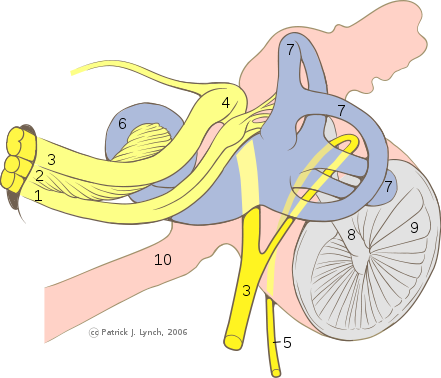Everyone is talking about balance these days, work/life balance, nutritional balance, balance balls, the need for more balance in day to day life, but little is mentioned about the very important vital sense organ that keeps you truly balanced: the inner ear.
Without a functioning inner ear your world would be spinning out of control for real. All sense of balance and natural equilibrium would dissolve into vertigo. It’s tough to care about work/life balance when land and sky begin to switch places.
But would you still need the same mechanisms of balance if you lived in the water?
According to the Encyclopedia of Marine Mammals article on balance by Fred Spoor, the answer is yes, mammals living in the water full-time still need a functioning inner ear. But a much smaller inner ear will suffice.
The inner ear serves two main purposes: keeps the brain abreast of any changes in gravitational direction and also notifies the brain of any linear acceleration of the head. It seems that these are important functions no matter where you live. Yet, for some reason whales, dolphins and porpoises have developed much smaller inner ears. In fact, their inner ear canal is “on average three times smaller for their body mass.”
To paint a more compelling picture Spoor provides this comparison: “These differences mean that the canals of a blue whale are just smaller than those of humans, and those of the bottlenose dolphin are smaller than those of a brown rat.” That’s so crazy, so quite possibly one of the few things humans can top when it comes to the largest animal to ever live on earth is the size of the inner ear.
But why would this be? Well, living full-time in the water frees whales, dolphins and porpoises from the restrictions of gravitational pull allowing them to do fabulous acrobatic stunts easily unlike those of us stuck on land. Also, whales, dolphins and porpoises have streamlined their bodies, uniting the head with the rest of the body. Fused cervical vertebrae allow very limited neck movement.
These two characteristics, living without much gravitational pull and having a head connected directly to the body reduce the need for a large inner ear. In fact, the encyclopedia explains that by having the head linked directly to the body that a smaller inner ear is probably necessary because it’s picking up the movement of the entire body instead of just the head. This way the inner ear isn’t so sensitive to full body input and can function properly in these circumstances.
And so the inner ear is still important to creating balance in the lives of whales, dolphins and porpoises, but a much smaller one does the job just fine.

Leave a Reply